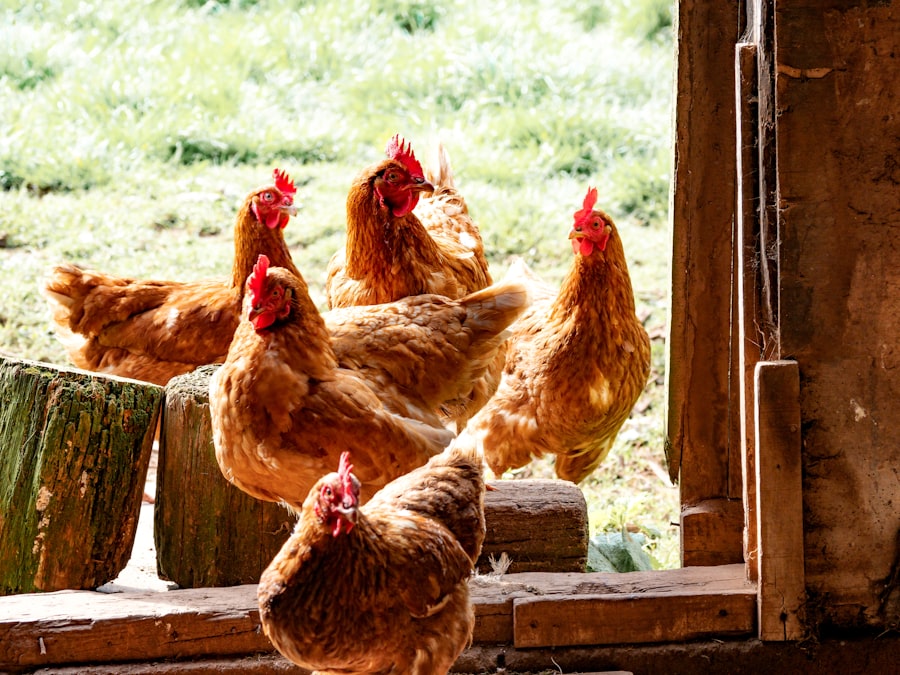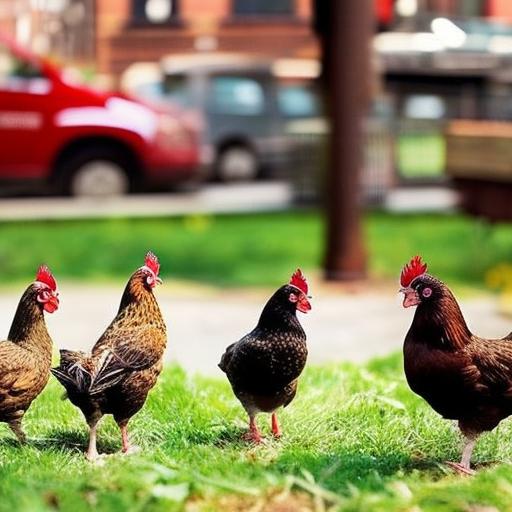Keeping chickens in urban areas, such as New York City, has become increasingly popular in recent years. Urban chicken keeping offers a unique opportunity for city dwellers to connect with nature, enjoy fresh eggs, and contribute to sustainable living. Despite the challenges of limited space and zoning regulations, many people are finding creative ways to incorporate chickens into their urban lifestyles.
Key Takeaways
- Keeping chickens in NYC is a growing trend among urbanites.
- Raising chickens in the city can provide fresh eggs, natural pest control, and a fun hobby.
- It is legal to keep chickens in NYC, but there are regulations to follow.
- Some chicken breeds are better suited for urban coops than others.
- Building a small chicken coop is possible with the right materials and design.
Benefits of Raising Chickens in the City
One of the primary benefits of raising chickens in the city is the availability of fresh eggs. Urban chickens produce eggs that are often superior in taste and quality compared to store-bought eggs. Additionally, raising chickens allows individuals to have control over the conditions in which the hens are kept, ensuring that they are treated humanely and fed a healthy diet.
Another advantage of urban chicken keeping is natural pest control. Chickens are excellent foragers and will eat insects, slugs, and other pests that can be problematic in gardens and yards. By allowing chickens to roam freely in designated areas, they can help keep pest populations under control without the need for harmful chemicals.
Chickens also provide a valuable source of fertilizer for gardens. Their droppings are rich in nitrogen, phosphorus, and potassium, which are essential nutrients for plant growth. By composting chicken manure and using it as fertilizer, urban gardeners can improve soil quality and promote healthy plant growth.
Raising chickens in an urban environment also offers educational opportunities for children. Children can learn about where their food comes from, the responsibilities of caring for animals, and the importance of sustainable living. It provides a hands-on learning experience that can foster a deeper connection to nature and an understanding of where our food comes from.
Legal Considerations for Keeping Chickens in NYC
Before embarking on urban chicken keeping in NYC, it is essential to familiarize yourself with the legal considerations involved. Zoning laws and regulations vary from neighborhood to neighborhood, so it is crucial to check with your local government or zoning board to determine if chickens are allowed in your area.
In some cases, obtaining a permit may be required to keep chickens in the city. Permits typically involve an application process and may require an inspection of the coop and run to ensure compliance with health and safety codes. It is essential to research the specific requirements for obtaining a permit in your area.
Health and safety codes are also important considerations when keeping chickens in the city. These codes typically address issues such as coop size, ventilation, waste management, and pest control. It is crucial to ensure that your coop meets these requirements to maintain the health and well-being of your chickens and prevent any potential issues with neighbors or local authorities.
Choosing the Right Chicken Breeds for Your Urban Coop
When selecting chicken breeds for an urban coop, it is essential to consider their suitability for small spaces, egg-laying capabilities, temperament, and noise level.
Certain breeds are better suited for small spaces due to their smaller size and ability to adapt to confined environments. Bantam breeds, such as Silkies or Seramas, are popular choices for urban chicken keeping due to their small size and docile nature. They require less space than larger breeds and can thrive in urban settings.
Egg-laying capabilities are another important factor to consider when choosing chicken breeds for an urban coop. Some breeds are known for their prolific egg production, while others may lay fewer eggs or have specific egg color preferences. Popular egg-laying breeds include Rhode Island Reds, Leghorns, and Australorps.
Temperament and noise level are also crucial considerations when selecting chicken breeds for an urban coop. Some breeds are known for being more docile and friendly, while others may be more skittish or aggressive. Additionally, some breeds are quieter than others, which can be an important consideration for maintaining good relations with neighbors.
Building a Chicken Coop in a Small Space
When building a chicken coop in a small space, there are several factors to consider, including whether to build it yourself or purchase a pre-made option, space-saving design ideas, and the materials and tools needed.
DIY options can be more cost-effective and allow for customization to fit specific space requirements. However, they require more time and effort to construct. Pre-made options, on the other hand, offer convenience and may be easier to set up but may be more expensive.
Space-saving design ideas are essential when building a chicken coop in a small urban space. Utilizing vertical space, such as building a multi-level coop or incorporating hanging nesting boxes, can help maximize the use of limited space. Additionally, using foldable or collapsible features can allow for easy storage when not in use.
When it comes to materials and tools needed for building a chicken coop, it is important to choose materials that are durable, weather-resistant, and easy to clean. Common materials include wood, wire mesh, and corrugated metal. Basic tools such as a saw, drill, hammer, and measuring tape are typically needed for construction.
Feeding and Caring for Your Urban Chickens

Proper nutrition and hydration are essential for the health and well-being of urban chickens. A balanced diet that includes a combination of commercial chicken feed, fresh fruits and vegetables, and access to clean water is crucial.
Commercial chicken feed is formulated to provide the necessary nutrients for chickens. It is available in different formulations depending on the age and purpose of the chickens (e.g., starter feed for chicks or layer feed for hens). Supplementing their diet with fresh fruits and vegetables can provide additional vitamins and minerals.
Cleaning and maintenance of the coop and run are also important aspects of caring for urban chickens. Regular cleaning helps prevent the buildup of waste and pests, ensuring a clean and healthy environment for the chickens. Coop bedding should be replaced regularly, and the coop should be thoroughly cleaned and disinfected periodically.
Health checks and preventative care are crucial for maintaining the health of urban chickens. Regularly inspecting chickens for signs of illness or injury, such as abnormal behavior, lethargy, or changes in appetite, can help identify potential health issues early. Vaccinations and parasite control measures may also be necessary to prevent common illnesses and infestations.
Health and Safety Concerns for Urban Chickens
While urban chicken keeping offers many benefits, there are also health and safety concerns that need to be addressed. Common illnesses and diseases that can affect chickens include respiratory infections, parasites, and bacterial infections. It is important to be aware of the signs and symptoms of these conditions and seek veterinary care if necessary.
Predators can also pose a threat to urban chickens. Common predators in urban areas include raccoons, rats, and neighborhood cats or dogs. Ensuring that the coop and run are secure with sturdy fencing and locks can help protect chickens from these predators.
Keeping chickens safe from traffic and other hazards is another important consideration. Chickens should be kept in a secure area away from busy roads or areas where they may be at risk of injury. Providing shade, shelter, and access to clean water is essential for their well-being.
Collecting and Using Chicken Eggs in the City
Collecting and using chicken eggs in the city is one of the most rewarding aspects of urban chicken keeping. To collect eggs, it is important to provide nesting boxes filled with clean bedding material where hens can lay their eggs. Eggs should be collected daily to prevent them from being damaged or eaten by predators.
Proper storage of eggs is crucial to maintain their freshness and quality. Eggs should be stored in a cool place away from direct sunlight or strong odors. They can be stored in the refrigerator or at room temperature, depending on personal preference.
Using fresh eggs in cooking and baking can elevate the taste and quality of dishes. Fresh eggs have a richer flavor and a vibrant yolk color compared to store-bought eggs. They can be used in a variety of recipes, from omelets and quiches to cakes and cookies.
Sharing eggs with neighbors and friends is another way to connect with the community and spread the joy of urban chicken keeping. It can be a fun way to introduce others to the benefits of raising chickens in the city and foster a sense of community.
Connecting with the NYC Chicken-Keeping Community
Connecting with the NYC chicken-keeping community is a valuable resource for urban chicken keepers. Online resources and forums provide a platform for sharing knowledge, asking questions, and connecting with other like-minded individuals. Websites such as BackyardChickens.com and UrbanChickenNYC.com offer a wealth of information and resources for urban chicken keepers.
Local meetups and events are another way to connect with the NYC chicken-keeping community. These gatherings provide an opportunity to meet other urban chicken keepers, share experiences, and learn from one another. Local agricultural fairs or farmer’s markets may also have chicken-related events or workshops.
Sharing knowledge and experiences with other urban chicken keepers can be a rewarding experience. It allows for the exchange of ideas, tips, and tricks, and can help overcome challenges that may arise when keeping chickens in an urban environment. Building a supportive network of fellow chicken keepers can enhance the enjoyment of urban chicken keeping.
The Joys of Urban Chicken Keeping
In conclusion, keeping chickens in NYC offers numerous benefits, including fresh eggs, natural pest control, fertilizer for gardens, educational opportunities for children, and a connection to nature in an urban environment. While there are legal considerations to be aware of, such as zoning laws, permit requirements, and health and safety codes, with proper planning and research, urban chicken keeping can be a rewarding and enjoyable experience.
Choosing the right chicken breeds for an urban coop, building a chicken coop in a small space, and providing proper nutrition and care are essential for the well-being of urban chickens. Health and safety concerns, such as common illnesses and diseases, predators, and hazards, should also be addressed to ensure the safety of the chickens.
Collecting and using chicken eggs in the city can be a delightful experience, and sharing eggs with neighbors and friends can foster a sense of community. Connecting with the NYC chicken-keeping community through online resources, local meetups, and sharing knowledge and experiences can enhance the enjoyment of urban chicken keeping.
Overall, urban chicken keeping offers a unique opportunity for city dwellers to connect with nature, enjoy fresh eggs, and contribute to sustainable living. It provides a way to bring a piece of the countryside into the city and create a more self-sufficient and environmentally friendly lifestyle. So why not give it a try? You may find that raising chickens in the city brings you joy, satisfaction, and a deeper connection to the natural world.
If you’re interested in keeping chickens in NYC, you’ll definitely want to check out this informative article on Poultry Wizard’s website. It provides valuable insights on creating a garden chicken coop, which is a great option for urban dwellers looking to raise chickens in limited space. The article offers practical tips and advice on how to design and maintain a coop that fits seamlessly into your backyard or garden. To learn more about garden chicken coops and how to get started, click here: https://poultrywizard.com/keeping-chickens/garden-chicken-coop/.
FAQs
What are the rules and regulations for keeping chickens in NYC?
In NYC, residents are allowed to keep up to six chickens on their property, but roosters are not permitted. Coops must be at least 2 square feet per chicken and located at least 10 feet from any residential building.
What do chickens need to thrive in an urban environment?
Chickens need a safe and secure coop to sleep in at night, access to fresh water and food, and a space to roam and scratch during the day. They also need protection from predators and extreme weather conditions.
What kind of food do chickens eat?
Chickens eat a variety of foods, including commercial chicken feed, grains, fruits, vegetables, and insects. It’s important to provide them with a balanced diet to ensure their health and egg production.
How often do chickens lay eggs?
The frequency of egg-laying depends on the breed of chicken and their age. Generally, chickens will lay one egg per day, but this can vary.
What are some common health issues that chickens may face?
Chickens can face a variety of health issues, including respiratory infections, mites and lice, and egg-laying problems. It’s important to monitor their health and seek veterinary care if necessary.
What are some benefits of keeping chickens in an urban environment?
Keeping chickens can provide a source of fresh eggs, reduce food waste by composting scraps, and offer an educational opportunity for children and adults alike. Chickens can also help control pests and weeds in a garden.
Meet Walter, the feathered-friend fanatic of Florida! Nestled in the sunshine state, Walter struts through life with his feathered companions, clucking his way to happiness. With a coop that’s fancier than a five-star hotel, he’s the Don Juan of the chicken world. When he’s not teaching his hens to do the cha-cha, you’ll find him in a heated debate with his prized rooster, Sir Clucks-a-Lot. Walter’s poultry passion is no yolk; he’s the sunny-side-up guy you never knew you needed in your flock of friends!







